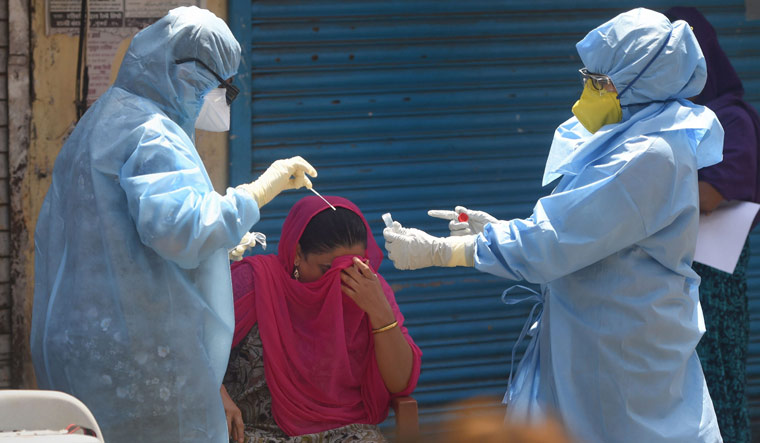From doing yoga routines to listening to music and reading literature to holy books—this is how many doctors and nurses working in the frontline of the war against COVID-19 are coping with the tremendous stress and anxiety that comes with their critical jobs.
Senior doctor V.K. Verma, who works at Delhi government-run Babu Jagjivan Ram Hospital, begins his day by performing 'pranayanams' and a few other 'asanas' before heading to work everyday.
For Dolly Massey, a senior nurse at a Max hospital in New Delhi, the Bible is her constant companion at the facility that she says keeps her "calm amid this storm".
"I keep a pocket Bible in my bag all the time and even an e-Bible on my mobile phone," Massey said. "I read Psalms and texts from the holy book during breaks, and before and after finishing work. It keeps me anchored, mentally and physically."
The 27-year-old said she never felt afraid even in the beginning when coronavirus had just come up or during the lockdown when the cases kept rising, and deaths were happening.
"But, now, I'm a little bit afraid that I might get infected too," she told PTI.
Delhi-born Massey, who hails from Dehradun, said she had been working with the Max Smart Hospital for the past four years.
"I'm a very God-fearing person and so, believe this pandemic is also a sign from Him for us humans to introspect, and repent for the mistakes that we have committed, whether it's damaging of our nature or not being sensitive to fellow human beings," she said.
From government hospitals to private facilities, doctors, nurses and other healthcare workers are at the forefront of the battle against the COVID-19 pandemic, and nearly 500 of them have tested positive for the disease in Delhi.
The heathcare workers are at a very high risk of contracting the infection as they are on the frontline of this COVID-19 war, according to Kumud Bharti, a senior doctor at the LNJP Hospital.
"While doctors are taking precautions with personal protective equipment (PPE) kits, gloves and other measures, and we know our duty to serve humanity in such situations, doctors, afterall, are also humans," Bharti said.
The LNJP Hospital, run by the Delhi government, is a dedicated COVID-19 facility and hundreds of coronavirus patients are admitted there. A senior technical supervisor who worked in the operation theatre at the hospital, had recently died of COVID-19.
"We keep hearing about doctors getting infected by COVID-19, so that fear is there somehow inside us too, who are serving. But, we have to do our job, taking the utmost precautions that we can," Bharti said.
Vikas Maurya, director, pulmonology and sleep disorders department at Fortis Hospital, Shalimar Bagh, said when the virus had just hit the country in the initial days, "there was a bit of fear in going near patients".
"But, then, serving humanity is our job and we actually now allow COVID patients to hold our hands if it gives him or her comfort," he told PTI. "I even pat on their shoulder sometimes, motivating them to think positive and fight the disease."
Maurya said high-quality PPE kits in enough numbers already brings a lot of ease to their minds, and patients' willpower and desire to live also "makes us doctors stronger".
"We slip into our PPE suits for six hours straight, initially medics were wearing it for even longer period. The entire innerwear gets drenched in sweat when we remove it.
"So, you can imagine the temperature inside. Plus, some doctors fear that there could be breach in PPE so that affects their mental well-being," Maurya added.
Asked how he keeps himself relaxed, Maurya said listening to music, watching some shows on TV or reading books at home is "how I unwind myself after duty hours".
Senior doctor V.K. Verma at Babu Jagjiwan Ram Hospital was apprehensive that more healthcare workers would be affected by COVID-19 with mounting cases as they were the first line of defence.
As many as 75 staff, including 12 doctors, had tested positive for coronavirus at this hospital recently.
According to Verma, what doctors see throughout the day, it plays on their minds.
"Everyday, I think, I might be carrying infection to my family," he said.
Initially, Verma added, many heathcare workers were being put up in hotels, but now many had no other option but to go to home after end of duty.
"I don't allow my family members to eat with me and, after returning from the hospital and taking a bath, I spend most of the time in the drawing room," he said.
"Some have houses which have very few rooms, where will they isolate themselves?" Verma asked. "And, they are afraid more about their family members than themselves."



